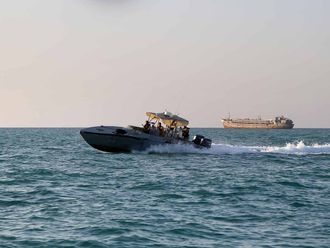Damascus: Another general has defected from President Bashar Al Assad’s regime to join the growing rebel ranks in Turkey, media reports said on Monday, ahead of a crucial Nato meeting on Syria shooting down a Turkish jet.
Turkey’s Anatolia news agency said the defection brought to 13 the number of generals seeking refuge in the country since the revolt erupted nearly 16 months ago.
It said the general, two colonels and some 30 soldiers and their families entered Turkey late on Sunday and were taken to Apaydin camp in Hatay province, some 4km from the border.
The defections come as Nato governments express mounting anger over the downing of a Turkish F-4 Phantom fighter by Syria as alliance ministers prepare to hold an emergency meeting today on the shooting.
Ankara says the aircraft was fired on over international waters, not inside Syrian airspace as Damascus maintains, and is urging ministers to honour the collective defence rights of a fellow Nato member.
French Foreign Minister Laurent Fabius on Monday called the incident “unacceptable.”
“This plane was not carrying arms and was on a routine flight ... there was no prior warning,” he said. “This is completely unacceptable.”
In Damascus, foreign ministry spokesman Jihad Al Makdissi insisted at a news conference that the plane had been over Syria.
“The Turkish warplane violated Syrian airspace, and in turn Syrian air defences fired back and the plane crashed inside Syrian territorial waters.
“What happened is a gross violation of Syrian sovereignty.
“If the goal of the [Nato] meeting is to calm the situation and promote stability, we wish it success,” Al Makdissi said.
But “if the goal of the meeting is aggression, we say that Syrian airspace, territory and waters are sacred for the Syrian army, just as Turkish airspace, territory and waters are sacred for the Turkish army.”
Today’s emergency Nato meeting follows a request from Ankara invoking Article Four of the alliance’s founding treaty, covering threats to members’ security.
Turkey has already acknowledged that the F-4 might at some point have entered Syrian airspace. But after an initially cautious response, it toughened its rhetoric on Sunday.
Foreign Minister Ahmet Davutoglu told Turkey’s TRT television that when it was shot down, the aircraft was in international airspace, 13 nautical miles from Syria and that Syria gave no warning before opening fire.
The fighter had been on an unarmed training mission, and both crew are still missing.
“Nobody should dare put Turkey’s [military] capabilities to the test,” Davutoglu said.
UN Security Council member Britain warned that Assad’s regime “should not make the mistake of believing that it can act with impunity.”
“It will be held to account for its behaviour,” Foreign Secretary William Hague said.
US Secretary of State Hillary Clinton condemned a “brazen and unacceptable act” and promised US assistance in the investigation.
“It is yet another reflection of the Syrian authorities’ callous disregard for international norms, human life, and peace and security,” Clinton said in a statement.
Turkish-Syrian relations have been strained by Prime Minister Recep Tayyip Erdogan’s outspoken condemnation of the Al Assad regime’s bloody crackdown, which activists say has killed more than 15,000 people since March last year.
France’s Fabius yesterday welcomed agreement to impose fresh European Union sanctions against Syria but called on the 27-nation bloc “to go further.”
“I’m satisfied that these new sanctions have been adopted but I would like to go further,” he told a Brussels news conference.
The new EU measures approved by bloc foreign ministers included a specific ban on insuring items embargoed for delivery to Syria, including arms shipments.
The prohibition follows an incident last week involving a British-insured Russian cargo ship reportedly carrying attack helicopters for Syria.
Russian President Vladimir Putin was in Israel on Monday to meet Prime Minister Benjamin Netanyahu and President Shimon Peres against the backdrop of the sustained violence in Syria.
The fighting claimed at least 91 more lives on Sunday, 59 of them civilians, the Britain-based Syrian Observatory for Human Rights said.
It also said rebels had shot down a Syrian regime helicopter near the Jordanian border.
“This is one of the bloodiest weeks in the conflict,” Rami Abdul Rahman, head of the Observatory, said.
“It’s like we are in a war. Sometimes when two countries are at war, not even 20 people are killed a day. But now in Syria it has become normal to have 100 killed each day.”
Syrian troops pounded the central city of Homs on Monday amid rebel Free Syrian Army warnings of an impending “massacre” and the opposition Syrian National Council urging international help “before it is too late.”












